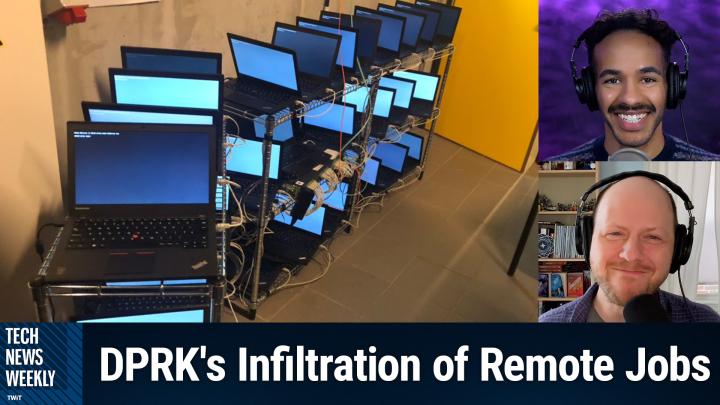What Apple May Announce at WWDC25
AI-created, human-reviewed.
Apple's Worldwide Developers Conference is just around the corner, and this year's event on June 9th could mark one of the most significant software transformations in the company's recent history. On a recent episode of Tech News Weekly, Mikah Sargent and Dan Moren of sixcolors.com discussed the emerging reports and industry speculation suggesting Apple appears ready to shake up both the visual identity and naming conventions that have defined its operating systems for over a decade.
The Solarium Revolution: A Glass-Inspired Design Overhaul
The most substantial change rumored for WWDC 2025 centers around a complete aesthetic redesign of Apple's operating systems. This new design language, reportedly codenamed "Solarium," draws inspiration from the Apple Vision Pro's glass-focused interface elements. The current design framework, which evolved from iOS 7's introduction more than ten years ago, may finally be getting its long-awaited successor.
This isn't merely a cosmetic refresh. The Solarium design philosophy represents Apple's vision for how users should interact with technology across all their devices, creating a cohesive experience that bridges the gap between traditional computing and spatial computing. The glass-like transparency and depth effects pioneered in visionOS could soon define the entire Apple ecosystem.
Breaking the Numbers Game: Hello iOS 26
Perhaps even more surprising than the visual overhaul is Apple's rumored plan to completely restructure how it numbers its operating systems. Instead of the current fragmented approach where iOS 18 might run alongside macOS 15 and watchOS 11, Apple is reportedly moving to a unified year-based numbering system.
This means we could see iOS 26, iPadOS 26, macOS 26, watchOS 26, tvOS 26, and visionOS 26 all announced simultaneously. The "26" designation refers to 2026, following the automotive industry's practice of releasing next year's model in the current year. This standardization would eliminate the confusion that has plagued users trying to understand which operating system versions are compatible with which features and devices.
The change addresses a long-standing pain point for both developers and consumers who have struggled to keep track of disparate version numbers across Apple's expanding ecosystem. However, questions remain about whether macOS will retain its California-inspired naming convention alongside the numerical designation.
Gaming Gets Another Shot
Apple's complex relationship with gaming may see another chapter at WWDC 2025. Reports suggest the company is developing a dedicated gaming application that would serve as a central hub for game discovery, social features, and Apple Arcade integration. This new app would revive and expand upon the functionality of the original Game Center application, which was demoted to a background framework in recent years.
The proposed gaming hub would handle leaderboards, friend connections, multiplayer coordination, and promotional content for Apple Arcade titles. However, Apple's track record with gaming initiatives raises questions about the company's genuine commitment to this space. As Moren observed during the podcast discussion, when Apple executives present gaming demos, "it's very Steve Buscemi with the skateboard over his shoulder. Hello, fellow kids, right, it doesn't feel genuine." Unlike the authentic enthusiasm Apple executives display when discussing music or design, their gaming presentations often feel less natural and compelling.
The Apple Intelligence Elephant in the Room
One of the biggest uncertainties surrounding WWDC 2025 involves Apple Intelligence, the AI framework announced with great fanfare at last year's conference. Many of the most anticipated features, particularly the enhanced Siri capabilities, never materialized despite repeated promises of "just a little more time."
This puts Apple in a challenging position. The company could choose to remain silent about AI developments, announce new Apple Intelligence features while the previous ones remain undelivered, or finally demonstrate the promised capabilities from 2024. Each approach carries significant risks, especially as competitors like Google continue advancing their AI offerings at a rapid pace.
The AI landscape has evolved considerably since Apple's initial Apple Intelligence announcement, and the company will need to prove that its approach remains competitive and viable. As Dan Moren noted on Tech News Weekly, "AI has not stood still in the meantime," while competitors continue pushing forward with new capabilities. Developers and consumers alike will likely demand concrete demonstrations rather than future promises.
What This Means for Developers and Users
These potential changes represent more than surface-level updates. A complete design language overhaul would require developers to reconsider their application interfaces and user experience flows. The unified numbering system could simplify compatibility discussions and feature planning across the Apple ecosystem.
For everyday users, the Solarium design could fundamentally change how they interact with their devices, potentially making the transition to future Apple products like updated Vision Pro models feel more natural and intuitive.
The Pressure is On
WWDC 2025 arrives at a critical moment for Apple's software strategy. The company faces increased scrutiny over its AI capabilities, questions about its gaming commitment, and the challenge of maintaining design leadership in an increasingly competitive landscape. The rumored changes suggest Apple recognizes the need for bold moves rather than incremental updates.
Whether these ambitious plans will translate into shipped features remains to be seen. Apple's recent track record with major announcements suggests a more cautious approach to promises and timelines may be warranted. The tech community will be watching closely to see if Apple can deliver on both the immediate impact of its design changes and the long-term vision for its software ecosystem.
As we approach June 9th, one thing seems certain: this year's WWDC could either mark a triumphant return to form for Apple's software innovation or highlight the growing challenges the company faces in a rapidly evolving technology landscape.
